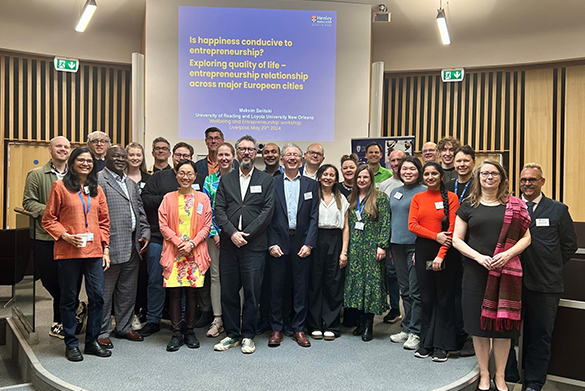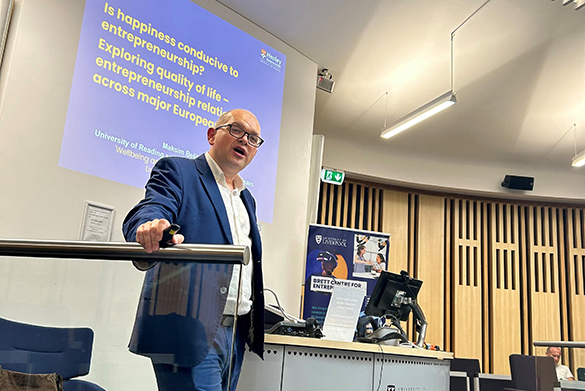Brett Centre for Entrepreneurship and the Centre for Organisational and Employee Wellbeing host joint workshop

The focus on ‘Well-being’ – both individually and within the world of work – has become increasingly popular in recent years and features prominently across the United Nations development goals.
In a joint event to discuss and debate ‘well-being’ from a range of perspectives within the field of entrepreneurship, the Brett Centre for Entrepreneurship and the Centre for Organisational and Employee Wellbeing convened a well-attended workshop with prominent international scholars which took place on Wednesday 29 May at the Brett Building.
Professor Matthew Statler (NYU Stern School of Business, USA) opened proceedings arguing that entrepreneurship might provide the possibility for playful and aesthetic experiences at work in which entrepreneurs could become the new guardians of an ideal state.
Professor Susan Marlow (University of Nottingham, UK) presented evidence on the negative effects of entrepreneurship on the well-being of female entrepreneurs by linking to overarching societal and domestic pressures, leading to business exit and a sense of personal failure.
From a philosophical perspective, Professor Daniel Hjorth (Copenhagen Business School, Denmark and Lund University, Sweden) problematised the underlying principles of well-being, arguing that it is ill-defined but it is this very existential vagueness and dynamism of a ‘well-becoming’ that can be the source for imagining new possibilities for living.

In presenting evidence from the City Ecosystem Index, Professor Maxsim Belitski (University of Reading, UK) outlined that people are happier working in cities where there are higher levels of entrepreneurial activity, leading to questions surrounding the veracity of available data sets and the measurement of well-being.
Chaired by Professor Robert Blackburn, Brett Centre for Entrepreneurship and Professor Damian O’Doherty, Centre for Oganisational and Employee Wellbeing, the occasion stimulated lively and engaging discussions, provoking debate, waged across the bows of different traditions of thought.
Professor Blackburn commented ‘The Workshop demonstrated the strength of a joint centre event to address contemporary societal challenges, enhancing the relevance and power of interdisciplinary approaches.’
Professor Damian O’Doherty said ‘This was highly original workshop that led to the posing of profound existential questions concerning things like our imminent extinction and set that against the possibility of achieving a sense of purpose and meaning for human lives. We are only beginning to be able to articulate these questions in the fringes of academic research where conventional wisdom and its ongoing uncritical application in mainstream management studies are being challenged.’
In an open-ended discussion with members of the workshop it was agreed that more research was needed so that we might find ways of escaping the bureaucratic divisions of knowledge and expertise that confines our capacity for novel theoretical and methodological adventure required if we are to find ways towards well-being.